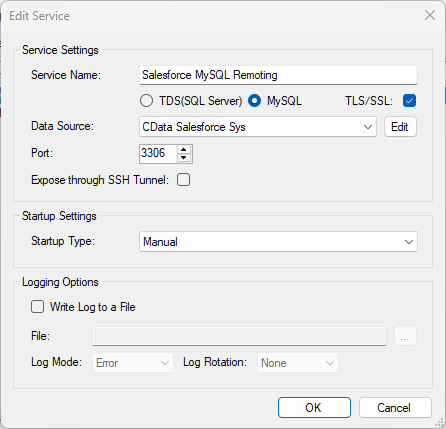Discover how a bimodal integration strategy can address the major data management challenges facing your organization today.
Get the Report →Access Workday Data from MySQL in PHP
Connect to Workday through the standard MySQL libraries in PHP.
You can use the CData SQL Gateway and ODBC Driver for Workday to access Workday data from MySQL clients, without needing to perform an ETL or cache data. Follow the steps below to connect to Workday data in real time through PHP's standard MySQL interfaces, mysqli and PDO_MySQL.
Connect to Workday Data
If you have not already done so, provide values for the required connection properties in the data source name (DSN). You can use the built-in Microsoft ODBC Data Source Administrator to configure the DSN. This is also the last step of the driver installation. See the "Getting Started" chapter in the help documentation for a guide to using the Microsoft ODBC Data Source Administrator to create and configure a DSN.
To connect, there are three pieces of information required: Authentication, API URL, and WSDL URL.
Authentication
To authenticate, specify your User and Password. Note that you must append your Tenant to your User separated by an '@' character. For instance, if you normally log in with 'geraldg' and your Tenant is 'mycompany_mc1', then your User should be specified as 'geraldg@mycompany_mc1'.
API URL
The API URL may be specified either directly via APIURL, or it may be constructed from the Tenant, Service, and Host. The APIURL is constructed in the following format: <Host>/ccx/service/<Tenant>/<Service>.
WSDL URL
The WSDLURL may be specified in its entirety, or may be constructed from the Service and WSDLVersion connection properties. The WSDLURL is constructed in the following format: https://community.workday.com/sites/default/files/file-hosting/productionapi/<Service>/<WSDLVersion>/<Service>.wsdl
Configure the SQL Gateway
See the SQL Gateway Overview to set up connectivity to Workday data as a virtual MySQL database. You will configure a MySQL remoting service that listens for MySQL requests from clients. The service can be configured in the SQL Gateway UI.

Connect in PHP
The following examples show how to use object-oriented interfaces to connect and execute queries. Initialize the connection object with the following parameters to connect to the virtual MySQL database:
- Host: Specify the remote host location where the service is running. In this case "localhost" is used for the remote host setting since the service is running on the local machine.
- Username: Specify the username for a user you authorized on the SQL Gateway's Users tab.
- Password: Specify the password for the authorized user account.
- Database Name: Specify the system DSN as the database name.
- Port: Specify the port the service is running on; port 3306 in this example.
mysqli
<?php
$mysqli = new mysqli("localhost", "user", "password", "CData Workday Sys","3306");
?>
PDO
<?php
$pdo = new PDO('mysql:host=localhost;dbname=CData Workday Sys;port=3306', 'user', 'password');
?>
Query in PHP
With the connection established, you can then access tables. The following steps walk through the example:
- Query the table; for example, Workers. The results will be stored as an associative array in the $result object.
- Iterate over each row and column, printing the values to display in the PHP page.
- Close the connection.
mysqli
$result = $mysqli->query("SELECT Worker_Reference_WID, Legal_Name_Last_Name FROM Workers WHERE Legal_Name_Last_Name = 'Morgan'");
while($row = $result->fetch_assoc()) {
foreach ($row as $k=>$v) {
echo "$k : $v";
echo "<br>";
}
}
$mysqli->close();
PDO
$result = $pdo->query("SELECT Worker_Reference_WID, Legal_Name_Last_Name FROM Workers WHERE Legal_Name_Last_Name = 'Morgan'");
while($row = $result->fetch(PDO::FETCH_ASSOC)) {
foreach ($row as $k=>$v) {
echo "$k : $v";
echo "<br>";
}
}
$result = null;
$pdo = null;






